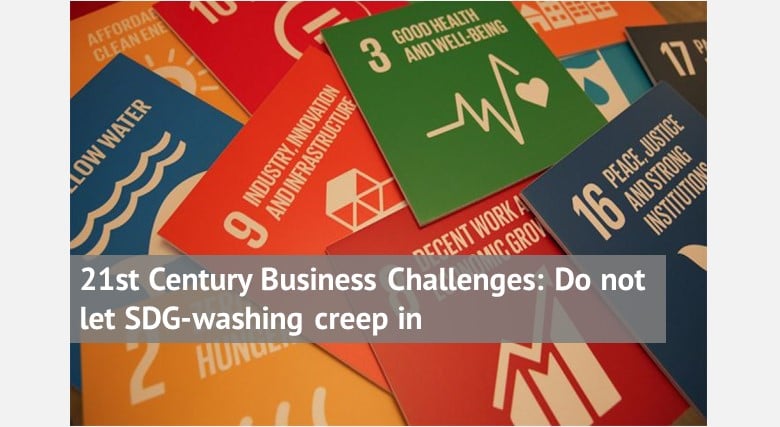In 2015, the 193 United Nations member states committed to the adoption and implementation of the 17 Global Goals for Sustainable Development (Sustainable Development Goals, SDGs) with the aim to end poverty, fight inequality and climate change by 2030 and to secure a sustainable prosperous future for the coming generations. From the early start, it was clear that the key players to accelerate the achievement of the SDGs would be companies. Looking at the contribution of private companies in the adoption and implementation of the Sustainable Development goals in their strategies, we often come across the term: SDG-washing.
What is SDG-washing?
SDG-washing is a term that is used to refer to companies that acknowledge the existence of the SDGs and present ways in which they align with the SDGs but without making any valid and meaningful contribution to their achievement. Companies may exaggerate or even present false claims about their commitment to do good and contribute to the achievement of the SDGs. In some cases, companies may be cherry-picking goals or even masking out their negative impact on some goals. For example, a company may contribute to the reduction of the proportion of youth not in employment (SDG 8↑). Yet, it may do that by hiring mostly male young people (SDG 5 ↓). This is one of many examples how companies can present that they are performing well in implementing one of the SDGs by hiding the negative impact they have on the other one.
How to avoid SDG-washing?
The World Business Council for Sustainable Development has revealed in their annual report for 2018 that 89% of its member companies’ reports have acknowledged the SDGs in some way, 53% of the reports have aligned sustainability strategy to the SGDs at goal level and provide clear evidence of activities to address them while only 15% have actually aligned their business strategy to specific SDG criteria and measured contributions to key SDGs. And the very key to avoid SDG-washing lies in the 169 targets and 232 specific indicators where the real change takes place. The purpose of the measurable indicators is to aid organizations and companies first understand and then measure, monitor and improve the progress being made. Simply claiming alignment with the SDGs will not produce the accurate or meaningful disclosure of the impacts a company wants to make. Instead, as a first step, companies should employ a depth analysis of their sustainability strategy and align it with the measurable and specific targets and indicators. As reinforced by OECD: “companies should do their due diligence on all SDGs”. Then deploy and implement a solid action plan which will help companies make real, honest and valid contribution to the achievement of the SDGs plan. Global Reporting Initiative (GRI), the UN Global Compact (UNGC) and the World Business Council for Sustainable Development (WBCSD) have released a practical guide for companies to maximize their contribution to the SDGs. UNGC as well, provides guidance on “Taking a Principles-based Approach to the Global Goals” to help companies uncover strategic opportunities and maximise their contribution to sustainable development.
Why to perform better on the SDGs?
The Sustainable Development Goals present the unique global initiative to lead the world to a prosperous and sustainable future that generations to come deserve. Yet, attaining the all 17 Goals is a huge and demanding task that asks for the mobilization of public, private and third sector, and no resources should be left unutilised. Especially companies have a chance to make a great contribution to secure a better future for all and at the same time to improve their performance as we presented in a recent blog on the benefits of SDGs for companies. Yet, this will be feasible only if companies commit wholeheartedly, without just adopting a surface level approach by ticking the boxes. It is not about ticking the boxes. It is about doing well by doing good.

